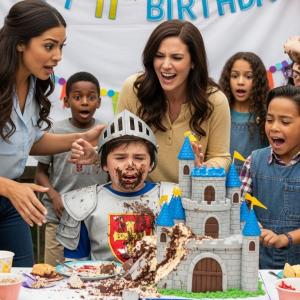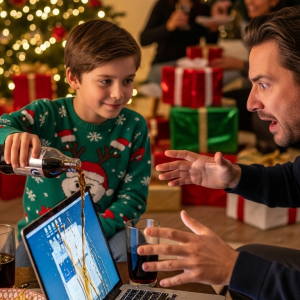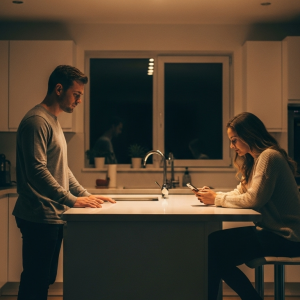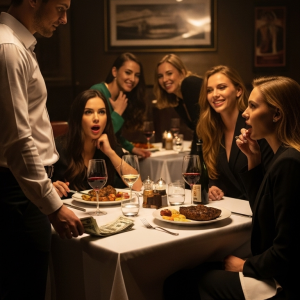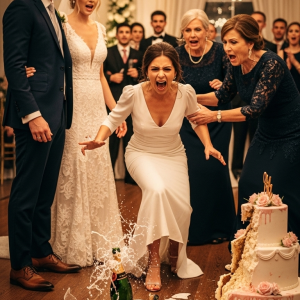Our childhood was a constant, demoralizing comparison. Our shared birthday was the most glaring example. Daniel’s parties were extravagant affairs, the house buzzing with his friends and laughter. My celebration was an afterthought, a footnote to his. He had sleepovers; I was forbidden from even having friends over. I came to loathe every moment spent in that house, a place that never felt like a home.
The only warmth I ever felt came from my grandmother. When she visited, her pockets were filled with my favorite chocolates, and she’d press a few dollars into my palm with a conspiratorial wink. “For you, my dear,” she’d whisper. “Treat yourself to something special.” She was my only ally.
As we grew, the favoritism curdled into open emotional abuse. My parents mocked my grades and belittled my hobbies. No matter how hard I tried, I could never be the perfect, quiet child they wanted. My talent for sports was seen not as a gift, but as a distraction. They barred me from all extracurriculars, determined to force me into the same academic mold as my brother. I felt trapped, helpless.
The breaking point arrived during my sophomore year. The crime? Having Snapchat on my phone. Like every other teenager, I used it to connect with friends. To my parents, this was a catastrophic breach of trust. They flew into a rage, tearing my room apart, their faces contorted with fury. In a final act of psychological warfare, they took the door off my hinges. “You want to have secrets?” my father roared. “Fine. You’ll have no privacy as long as you live under our roof.”
And through it all, Daniel watched. He didn’t defend me. Instead, he saw his opportunity.
The toxic environment my parents cultivated became Daniel’s playground. He learned to exploit their bias, turning it into a weapon against me. He began a pattern of calculated lies, blaming me for his own misdeeds. If he stole money from our mother’s purse, he would flawlessly pin it on me. My parents, already predisposed to believe the worst, never questioned him.
He demeaned me at school, making fun of my appearance in front of my friends. Yet, despite his efforts, I was well-liked. I was outgoing and approachable, and my circle of friends was wide. Daniel, an introvert, struggled socially. His resentment festered. The jealousy reached a boiling point on our 14th birthday. For reasons I’ll never know, none of his friends showed up for his party. In stark contrast, my friends took me out for ice cream. I had a wonderful day.
This final humiliation infuriated him. His revenge was insidious. He started a rumor at school, painting me as a spoiled brat who physically abused him at home. To give his lies credibility, he took things to a disturbing new level. He began hurting himself, purposefully punching his own face to create a black eye or bruising his own shoulder. The next day, he would walk the school halls like a martyr, displaying his self-inflicted injuries as proof of my “violence.”
When our parents asked about his bruises, he’d lie with chilling ease, attributing them to a rough game of football. Slowly, his story gained traction. Whispers followed me down the hallways. Friends who once greeted me with smiles now offered only suspicious glances. Invitations to hang out dried up. It was like a switch had been flipped.
Finally, I confronted my best friend. Her eyes filled with pity. “It’s Daniel,” she confessed. “He’s been telling everyone… these horrible stories.” The world tilted. The ground fell away from beneath me. My brother, my own twin, was systematically destroying my life out of pure spite. I confronted him, begging him to stop. He just smirked, his eyes cold and empty. “You deserve to rot alone,” he hissed. I was terrified. I wanted to tell my parents, but I knew with sickening certainty who they would believe.
The rumors inevitably reached the principal’s office. My worst nightmare became reality. I was summoned, along with Daniel and my parents, to “discuss the situation.” My heart hammered against my ribs as the principal asked for the truth. I prayed Daniel would finally confess.
He did the opposite. He doubled down, his voice trembling with fake fear as he recounted a detailed, twisted narrative of my “abuse.” He claimed I was jealous of the love he received from our parents and took it out on him physically.
My mother burst into tears, clutching Daniel as if he were a war hero. My father placed a hand on his shoulder. “It was brave of you to speak up, son,” he said, his voice thick with emotion. “We’ll make sure she never hurts you again.”
I was drowning. “It’s all a lie!” I screamed, tears streaming down my face. “He’s lying!” But my pleas were lost in the storm of their manufactured sympathy. The principal, seeing my parents’ reaction, delivered his verdict. The school had a zero-tolerance policy for bullying. I was to be suspended for ten days.
The humiliation was absolute. My parents dragged me from the office, their faces masks of anger and shame. When we got home, my father began packing a suitcase with my belongings. “What are you doing?” my mother asked, her voice uncharacteristically small. “I won’t have a monster like her in the same house as him,” he snarled, not even looking at me.
He threw my suitcase into the foyer. I fell to my knees, clinging to his legs, begging him not to throw me out. He kicked my hands away. “A bully like you doesn’t deserve this family,” he said coldly. “I’ll call your grandmother. If she wants you, she can come and get you.”
Eventually, she did. My grandmother, my savior, arrived with quiet fury. She helped me pack my things into her car. Then, she walked to the front door and rang the bell. When my father opened it, she unleashed a storm. “How dare you?” she yelled, her voice cracking with rage. “She is a child! If you ever try to contact her again, I swear I will involve the police. What you’ve done today is a crime.”
My mother tried to argue, but my grandmother cut her off. She was a titan, a shield I never knew I had. As we drove away, leaving behind the only home I had ever known, the pain was indescribable. My grandmother held my hand, promising she believed me. For the first time in a long time, I felt a flicker of hope. I had one person left in the world who was on my side.
Returning to school after the suspension was like walking into a lion’s den. I was an outcast, a ghost in the hallways of my own life. I kept my head down, ate lunch alone, and went straight home to my grandmother’s house every day. My parents never called. Not once.
I graduated with good grades and escaped to college, where I tasted freedom for the first time. No one was watching me, no one was judging me. I made new friends and slowly began to put the pieces of myself back together. It was during this time that I discovered my knack for content writing. To earn side money, I started freelancing on various websites, slowly building a portfolio and a reputation.
After graduation, I bypassed the corporate world and pursued writing full-time. The freelance life suited me. It gave me financial independence and the freedom to become a digital nomad. Traveling became my therapy. Seeing the world helped heal the wounds of my past.
Throughout it all, my grandmother remained my anchor. I visited her every weekend I could, sharing meals, helping with chores, or simply sitting on her porch, talking for hours. She was my family.
Recently, my career hit a major milestone. I completed a project for a huge, well-known brand. Thrilled, I asked the team for reviews, which they happily provided. I posted screenshots of their praise on my Instagram. The response was immediate. Other writers congratulated me, and my post was shared widely. Soon, strangers were messaging me for work. My college principal saw my success and invited me to give a seminar on content writing. Standing before those students, sharing my story of struggle and perseverance, felt like my life had come full circle.
Clips from the seminar went viral. And then, I was invited to speak on a local news channel. That was the tipping point. The broadcast reached relatives who had no idea what had become of me. And, inevitably, it reached my parents.
A few days after the TV interview, I was deep in a project when I noticed six missed calls from my mother. A cold dread washed over me. It had been over a decade. Hesitantly, I called back.
She answered immediately, her voice syrupy sweet. “Honey! We saw you on TV! We are so, so proud of you!” My father jumped on the line, echoing her congratulations, asking about my life. I answered curtly. Then came the real reason for the call.
“So,” my father said, his tone shifting slightly, “you must be doing very well for yourself. How much are you earning these days?” “That’s none of your business,” I replied, my voice sharp. “We’re family!” he insisted. “You shouldn’t be shy.” My mother took over. “Listen, darling,” she began, her voice turning pathetic. “Your father and I are retired now. The house… it needs renovations. We have no savings left. We thought… maybe you could help us out?”
The audacity was breathtaking. “Are you joking?” I asked, my voice dangerously quiet. “You haven’t spoken to me in over ten years, and now you want money?” Their pleas for “family duty” and “doing the right thing” filled me with a white-hot fury. But instead of just screaming at them, an idea formed in my mind—a way to teach them a lesson they would never forget.
“Alright,” I said, my voice steady. “I’m willing to help you. On one condition.” “What is it?” my father asked eagerly. “You will host a gathering,” I stated, “with all of our close family and friends. And at that gathering, you will publicly admit that Daniel lied. You will tell everyone that he orchestrated the rumors, that he hurt himself to frame me, and that you threw an innocent child out of your home because you chose to believe him. You will humiliate him the way you humiliated me. You will take accountability.”
There was a stunned silence on the other end of the line. My father sputtered, asking why such a public spectacle was necessary. My mother pleaded for a “private discussion.” “No,” I said, the word like a stone. “This condition is non-negotiable. That is the price of my help.” I reminded them that they hadn’t raised me; my grandmother had. They grew agitated, but I held my ground. If they wanted my money, the world would first have to know the truth.
Since that call, my parents have been trying to contact me incessantly. I’ve ignored them. Then, my brother sent me a message.
“Hey sis. Heard you gave Mom and Dad a crazy ultimatum. They’ll never do it, you know that right? They never loved you. I admit I lied 15 years ago, but it’s ancient history. Stop being so selfish and move on. You’re unmarried and childless anyway, what else do you have to spend your money on? Do the right thing and be a better daughter.”
That was the final piece of evidence I needed. His callous dismissal of my pain, the cruel jab at my life choices, the admission of his guilt—it was all there. Fueled by a desire for justice, I sat down and wrote an email.
I sent it to my parents and all our close relatives. In it, I detailed everything: the years of favoritism, the psychological abuse, the lies Daniel spread, and the moment my own parents cast me out. At the end of the email, I attached a screenshot of Daniel’s text message. His confession.
I hit “send.” I knew all hell was about to break loose.
And it did. My family erupted. Relatives who had been kept in the dark called me, horrified, apologizing for their ignorance. My parents and brother sent a barrage of abusive, threatening messages. This time, I didn’t engage. I hired a lawyer, who sent them a cease and desist notice. The threat of legal action scared them into silence.
My grandmother, my rock, told me I had done the right thing. Her approval was the only one that ever mattered.
Two months have passed. My life is blessedly quiet. My business is flourishing. The invitations to speak at seminars and on podcasts continue to come, solidifying my place as a voice in my field.
I recently took a week off to spend with my grandmother. She’s taken up gardening, and she taught me about the flowers and herbs filling her backyard. Those moments—sharing meals, laughing on her porch, feeling the sun on my face—are the memories I cherish now. They are my peace.
My parents and brother have remained silent since the lawyer’s letter. They are ghosts from a life that is no longer mine.
I’ve started going to therapy. There are still scars, deep ones, that need healing. But for the first time, I feel completely in control of my own story. This, I think, will be my last update. My past is finally in the past, and my future is my own to write
